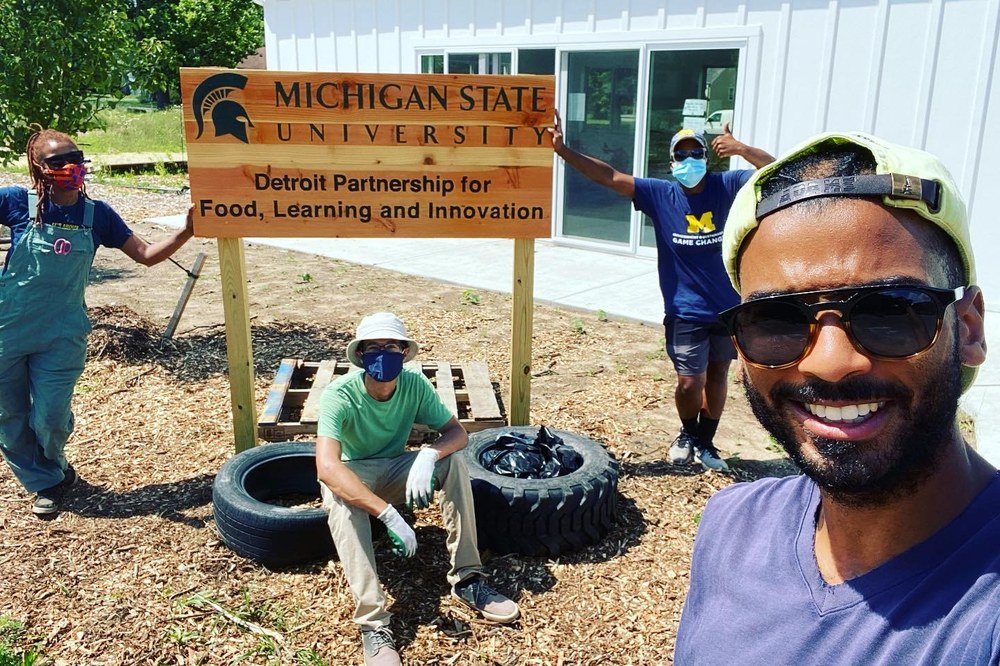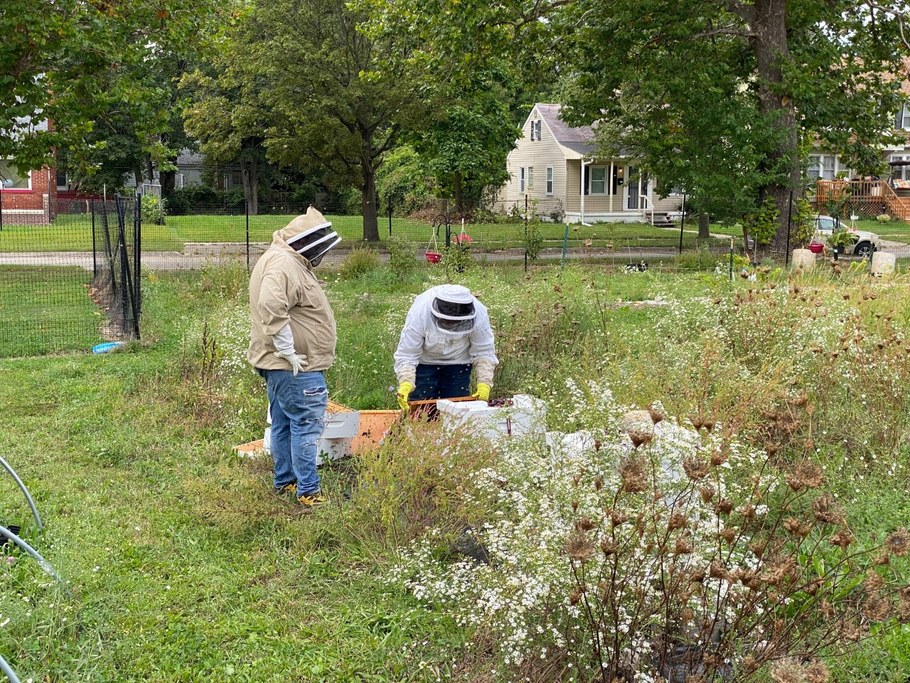Posted: October 20, 2021
Improved access to nutritious food is one important outcome of urban agriculture; however, working collectively also has important social and economic implications.

Naim Edwards and students pose in front of the Detroit Partnership for Food, Learning and Innovation sign
By Effie Palacios and Justine Lindemann
Naim Edwards is an extension educator in Detroit and the director of the Michigan State University's urban agriculture center - the Detroit Partnership in Food, Learning and Innovation, also known as DPFLI (pronounced D.P. Fly). He will tell you that growing food in cities is nothing new. In fact, he asserts that agriculture - urban and rural - has always brought people together to collaborate for a common goal:
"I understand agriculture to be the first collective, intentional, human activity that played a role in establishing permanence in a land mass, region, or territory. People were collectively pooling resources, seeds, tools, in order to cultivate food consistently in the same location and that practice served as the foundation for developing civilization."
Community collaboration, including in agriculture, builds stronger social bonds and networks which can also provide human and organizational support during challenging times. For example, social bonds make people more likely to support and help neighbors in need, which contributes to community growth and positively impacts food access but also other social and economic needs. Disruptions to this kind of collaboration can have broad - and at times devastating - effects on individuals, neighborhoods, and society as a whole.

Edwards sees agriculture - and DPFLI - as a starting point for building more just and resilient human systems. The DPFLI, a center for teaching, learning, and research, is charged with developing solutions to economic and food-related challenges in the urban environment. The partnership is embedded in the community. The Partnership, and thus MSU Extension is accessible to community members through garden plots, outdoor space, and a burgeoning edible landscape. community resilience through agriculture is grounded in the idea that agriculture can be a vehicle for fostering human relationships, a "solution to environmental degradation," and as well as "an educational or biodiversity conservation tool."
Community resilience is key not only to withstanding complex challenges or threats to human society, but also to improving our capacity to adapt to them. The covid-19 pandemic, Edwards argues, has exposed the fragility and failures within the existing food system. Everything from work stoppages and labor shortages to transportation backups from rural farms to urban centers and rising costs of food have created instability and inequity in food access. Other challenges such as changing weather patterns and an increase in natural disasters as a result of climate change will also continue to negatively affect food systems.
"Urban agriculture can certainly address local food production...If agriculture was scaled up, there would be more opportunities for people to have purpose and meaning in life by growing food for themselves and for others."
Michigan State University Extension, through its DPFLI initiative, is investing in the potential of more localized urban food production and making a statement about the importance of investing in and engaging with people in urban space. This creates an entry point for building urban community resilience. From an economic standpoint, urban agriculture has the potential to create jobs across the food system, including growing, storing, transporting or delivering, marketing and branding, and retailing food products. These all contribute to local economic growth. In addition to "reducing the cost of food," Edwards notes that urban agriculture allows residents "to generate wealth - or at least income - by selling food, growing food for others, or being employed in the (local urban) food system."
Understanding urban agriculture in this way shows how food system participation is a proxy for both equity and resilience. Many of the social and economic dimensions of urban resilience can be built through community involvement in growing food, which can also build a more equitable urban food system: affordability, community control, localized production, job creation, and collaboration. For the system to be both resilient and equitable, community residents must have a voice, share in the work, and collaboratively manage both the benefits and challenges that arise.
So, how do we make this happen? Edwards highlights two key requirements for the successful development of urban agriculture from a community resilience perspective: long-term commitment, and a culture shift.
MSU Extension is investing in DPFLI: in the land, the people, and the community. If Extension is to operate successfully in urban environments and support communities in building resilience, projects require sustained funding and people power. Secondly, Extension should understand urban agriculture as a different approach to agriculture, but not as completely separate from agriculture beyond cities. In other words, "if you can inform farmers how to grow better food and control for pests and whatever they're doing in rural environments, then the challenges are no greater...for doing that in urban settings." Both urban and rural engagements require building relationships within the community, taking the time to get to know people, their needs, and how Extension can support communities in meeting those needs.

This perspective is important in deconstructing dichotomous thinking about urban and rural - as if the two are completely separate from each other. This type of thinking can prevent Extension and other organizations from expanding their work into so-called "non-traditional" spaces. This applies to other realms of Extension. Edwards is working to expand the scope of DPFLI to include a variety of Extension programs, including mental health, robotics, small business development, and nutrition, as well as provide space for agricultural research and experimentation. These programs are implemented in both urban and rural areas, adapted to the particular needs of the communities they are serving.
Edwards asserts, "In order for Cooperative Extension to continue to be relevant in the 21st century, Land Grant institutions must acknowledge and integrate the value of urban agriculture and localized food systems into their work with communities." Solutions to food system challenges in Detroit may look different than in other U.S. cities; however, human collaboration lies at the heart of building and sustaining community resilience, and Extension institutions have an important role to play.
If you would like to receive The Urban Resilience Report in your inbox, please join the listserv.

